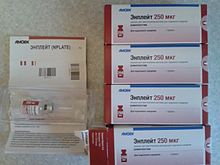Romiplostim

 | |
| Clinical data | |
|---|---|
| Trade names | Nplate, others |
| Other names | AMG531 |
| AHFS/Drugs.com | Monograph |
| MedlinePlus | a609008 |
| License data |
|
| Pregnancy category |
|
| Routes of administration | Subcutaneous |
| ATC code | |
| Legal status | |
| Legal status | |
| Pharmacokinetic data | |
| Elimination half-life | 1 to 34 days |
| Identifiers | |
| |
| CAS Number | |
| IUPHAR/BPS | |
| DrugBank | |
| ChemSpider |
|
| UNII | |
| KEGG | |
| ChEMBL | |
| Chemical and physical data | |
| Formula | C2634H4086N722O790S18 |
| Molar mass | 59085.01 g·mol−1 |
| | |
Romiplostim, sold under the brand name Nplate among others, is a fusion protein analog of thrombopoietin, a hormone that regulates platelet production.
The most common side effects in adults include headache, infections of the nose and throat, and allergic (hypersensitivity) reactions such as rash, itching and rapid swelling under the skin.[1] The most common side effects in children include infections of the nose and throat, runny nose, cough, fever, mouth and throat pain, abdominal (belly) pain, diarrhea, rash, and bruising.[1]
Medical uses
[edit]Romiplostim is indicated as a potential treatment for chronic idiopathic (immune) thrombocytopenic purpura (ITP).[2]
Clinical efficacy
[edit]In well designed, 24-week, Phase III trials, romiplostim was significantly more effective than placebo in achieving the primary endpoint of a protocol-defined durable platelet response in nonsplenectomized or splenectomized adults with chronic immune thrombocytopenic purpura.[3]
History
[edit]Romiplostim was developed by Amgen through a restricted usage program called NEXUS.[4] During development and clinical trials the drug was called AMG531.[5]
Romiplostim was designated an orphan drug by the US Food and Drug Administration (FDA) in 2003[6]
In August 2008, the FDA approved romiplostim as a long-term treatment for chronic immune thrombocytopenia in adults who have not responded to other treatments, such as corticosteroids, intravenous immunoglobulin, Rho(D) immune globulin or splenectomy.[4][7]
Society and culture
[edit]Economics
[edit]The wholesale cost of romiplostim if administered weekly is currently estimated at US$55,250 per year.[8]
Research
[edit]Romiplostim may be used to treat acute radiation syndrome.[9] "To reduce radiation-induced bleeding, Nplate stimulates the body’s production of platelets. The drug can be used to treat adults and children."[9]
References
[edit]- ^ a b c "Nplate EPAR". European Medicines Agency (EMA). 27 May 2005. Retrieved 16 May 2024. Text was copied from this source which is copyright European Medicines Agency. Reproduction is authorized provided the source is acknowledged.
- ^ Kuter DJ, Bussel JB, Lyons RM, Pullarkat V, Gernsheimer TB, Senecal FM, et al. (February 2008). "Efficacy of romiplostim in patients with chronic immune thrombocytopenic purpura: a double-blind randomised controlled trial". Lancet. 371 (9610): 395–403. doi:10.1016/S0140-6736(08)60203-2. PMID 18242413. S2CID 23827197.
- ^ Frampton JE, Lyseng-Williamson KA (2009). "Romiplostim". Drugs. 69 (3): 307–317. doi:10.2165/00003495-200969030-00006. PMID 19275274.
- ^ a b Waknine Y (4 September 2008). "FDA Approvals: Nplate, Aloxi, Vidaza". Medscape. Retrieved 4 September 2008.
- ^ Bussel JB, Kuter DJ, George JN, McMillan R, Aledort LM, Conklin GT, et al. (October 2006). "AMG 531, a thrombopoiesis-stimulating protein, for chronic ITP". The New England Journal of Medicine. 355 (16): 1672–1681. doi:10.1056/NEJMoa054626. PMID 17050891.
- ^ "Amgen to Discuss Romiplostim BLA". drugs.com. 12 March 2008. Retrieved 4 November 2008.
- ^ "FDA Approves Nplate for Long-Term Treatment of Adult Chronic ITP" (Press release). Amgen. 22 August 2008. Archived from the original on 15 September 2008. Retrieved 4 September 2008.
- ^ Perreault S, Burzynski J (May 2009). "Romiplostim: a novel thrombopoiesis-stimulating agent". American Journal of Health-System Pharmacy. 66 (9): 817–824. doi:10.2146/ajhp080524. PMID 19386944.
- ^ a b Roberts L (5 October 2022). "US splashes $290m on anti-radiation drugs after Putin ups nuclear threats". The Daily Telegraph. Retrieved 10 October 2022.